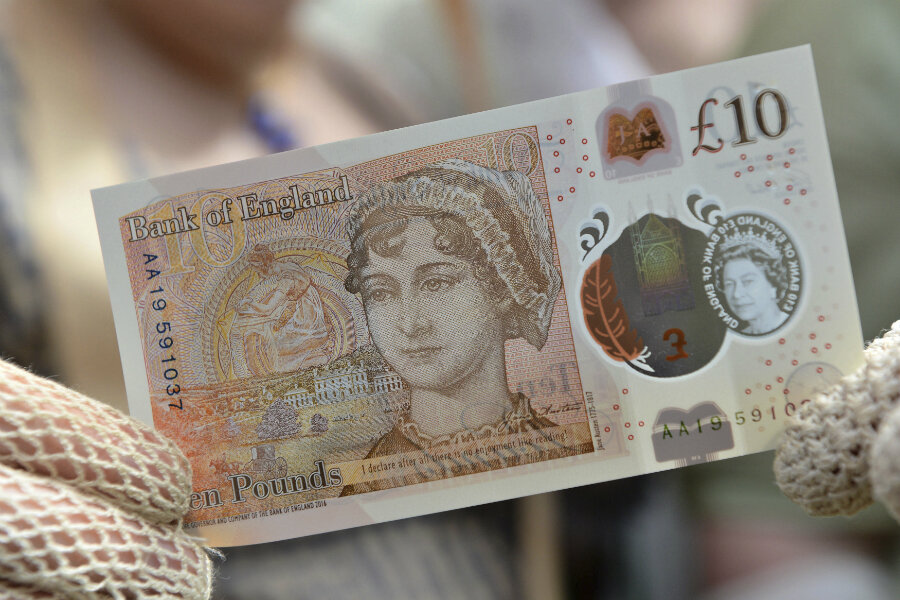Cents and sensibility: Jane Austen graces British 10-pound note
Loading...
| London
Two hundred years to the day after Jane Austen died, a new 10-pound note featuring an image of one of England's most revered authors has been unveiled – right where she was buried.
At the unveiling Tuesday of the new "tenner" at Winchester Cathedral in southern England, Bank of England Governor Mark Carney said the new note celebrates the "universal appeal" of Ms. Austen's work.
Austen, whose novels include "Pride and Prejudice," ''Emma," and "Sense and Sensibility," is considered one of the most perceptive chroniclers of English country life and more in the Georgian era. Combining wit, romance, and social commentary, her books have been adapted countless times for television and film.
"Our banknotes serve as repositories of the country's collective memory, promoting awareness of the United Kingdom's glorious history and highlighting the contributions of its greatest citizens," Mr. Carney said.
The new note, which is due to go into circulation on Sept. 14, is the bank's latest effort to make its notes more secure by using plastic, not paper.
It's printed on polymer, just like the recently re-launched 5-pound note, which features Winston Churchill. A new 20-pound note that will feature the landscape painter J.M.W. Turner is also in the works and scheduled to be rolled out in 2020.
The new note also includes a new tactile feature to assist the visually impaired, which was developed in conjunction with the Royal National Institute of Blind People.
Apart from Queen Elizabeth II, whose portrait is on all British currency, Austen is only the third woman to feature on a modern-day British bank note, after medical innovator Florence Nightingale and social reformer Elizabeth Fry. She was chosen after a campaign for more female representation.
As well as a portrait of Austen commissioned by her nephew in 1870, the note features a quote from "Pride and Prejudice": "I declare after all there is no enjoyment like reading!"
Some Austen fans questioned the choice of the quote – spoken in the novel with deep insincerity by the unlikable Caroline Bingley.
Carney said that the quote was quintessential Austen: It could be read straight or enjoyed ironically.
"It works on many levels," he said.
A tenner, as it's commonly known in Britain, doesn't go that far anymore. It's worth about $13 and it could yield an Austen novel or maybe two and, at a stretch, a trip to the cinema to see one of those Austen adaptations.
Analysis by the insurance firm Aviva shows how inflation has bitten into the value of the pound to the tune of 99 percent since Austen's death. Aviva says something that cost 10 pounds in 1817 would cost 786 pounds today.
"Today's new 10-pound note allows us to powerfully demonstrate the impact of inflation over time," said Alistair McQueen, Aviva's head of saving and retirement.
Those holding the current 10-pound note, which features Charles Darwin, have only until the spring 2018 before they are withdrawn. An exact date will be announced three months in advance, the Bank said.







